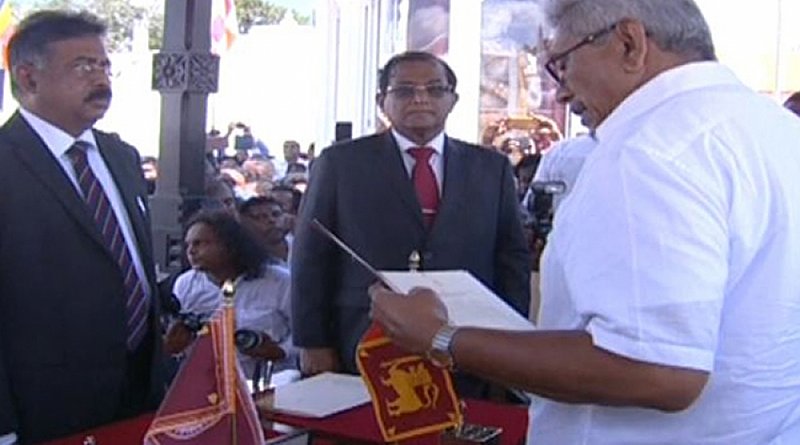Sri Lanka: Beyond The Presidential Elections – Analysis
By IPCS
By Dr Sripathi Narayanan*
The result of the 2019 Sri Lankan presidential election was on expected lines because of the nature of the captive vote-bank of the frontrunners, Sajith Premadasa, and the winner and now President, Gotabaya Rajapaksa. The campaign and the poll, in many ways, were contested on electoral arithmetic similar to that of Sri Lanka’s 2005 presidential election and all subsequent elections, big and small. It is for this very reason that losing candidate, Sajith Premadasa, like the then incumbent Mahinda Rajapaksa in 2015, conceded defeat even during the early stages of counting of the votes.
For (now) President Gotabaya Rajapaksa, like his brother Mahinda Rajapaksa (who is now prime minister), their primary political base was majority Sinhala-Buddhist constituency in the South. Premadasa, like all previous political rivals of the Rajapaksas, was able to consolidate that strata of the Sinhala society which is not conservative, along with religious and linguistic minorities – namely the Tamils of the North and the Muslims. This divide in the electoral map is one that has not only dominated the politics of the country but has also been the determining factor in shaping the nation’s polity.
However, for Sri Lanka, this presidential election is just a precursor to the parliamentary polls, which are a few months away. Given the polarising aspect of the presidential elections, a similar voting pattern can be expected in the parliamentary polls as well. If that takes place, then Sri Lanka’s domestic politics would not only be at loggerheads but would exacerbate prevailing social divisions. The inability of the electorate and the political class to bridge the communal divide has been one factor that has dominated the politics of the country but for Sri Lanka, it is time to go beyond these fissures and to script its politics and political identity beyond the ethnographic lines.
Ghosts of the Past
India’s Prime Minister, Narendra Modi, was one of the first political leaders of the world to congratulate Gotabaya on his victory and also to invite him to visit India. This was followed Indian External Affairs Minister, S Jaishankar’s, visit to Colombo, thereby indicating a reset in the bilateral ties between the two countries. This is of consequence as India-Sri Lanka bilateral ties during the previous Mahinda Rajapaksa dispensation was strained owing to a number of issues, including the ‘China factor’.
Nonetheless for Sri Lanka, its primary concern would be not only balancing its ties with the two Asian giants, India and China, but also its partners in the West. Even prior to the elections, the US had kicked up a storm when it expressed its reservations on the elevation of Lt. Gen Shavendra Silva as the Commander of Sri Lanka’s army. For Washington, Gen Silva, who in his earlier capacity was one of the few field commanders responsible in ending Sri Lanka’s civil war, has been on the radar for alleged war crimes and human rights violations. Coupled with the 2019 Easter Sunday bombings, the US position on internal security concerns not only made national security an election issue but also made protecting the honour of the country’s military a campaign plank for the two main candidates.
However, for Sri Lanka, now back under the Rajapaksas, allegations of human rights violations in the closing days of the civil war could return to haunt. This is because the initial post-poll reaction of the US, which was the main sponsor of the UN Human Rights Council (UNHRC) resolution on the war-crimes probe in Sri Lanka, was not a note of congratulation but caution. In a statement to the press, the US called upon the new administration in Sri Lanka to uphold the country’s commitments to security sector reform, accountability, respect for human rights, and non-recurrence of violence.
These were the very issues that had consumed much of the country’s energy on the external front during the previous Rajapaksa dispensation post war (under Mahinda Rajapaksa), and that of then Defence Secretary and now President, Gotabhaya Rajapaksa. Even at the time of commencement of the polling campaign, Gotabhaya had rejected the UNHRC process, like the Rajapaksas had previously done when in power.
The US, by raking up issues of the past, has not only drawn the battle-lines for the new dispensation in Colombo and but also sketched Sri Lanka’s foreign policy outlook. ‘Accountability issues’ had made the Rajapaksas unpopular not only at home but also overseas. This matter also became a catalyst in consolidating Sri Lanka’s ties with China given how Beijing not only refrains from talking about such sensitive domestic issues but has also stood by Colombo, when needed and wherever needed, including at the UN Security Council and the UNHRC. Gotabhaya’s primary interest thus would not be in befriending more in the comity of nations, but in combating the ghosts that had plagued him and his brother Mahinda during their previous stint in power and later as well.
India, on the other hand, would now not only have to re-establish fraternal ties with the Rajapaksas but would also have to be seen as doing so in ways that the larger section of the Sinhala society, too, would understand, in addition to ethnic Tamils. This would mean that on issues of accountability, India would have to sing a new tune, after voting for UNHRC resolutions in the past, and in ways that is heard loud and clear, despite its interest in the Tamils of the island state.
*Dr Sripathi Narayanan is an Assistant Professor, Jindal School of International Affairs, O.P. Jindal Global University, India. He can be reached at [email protected]

